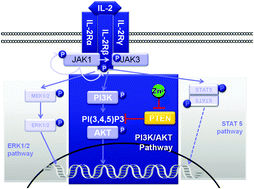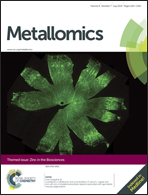PTEN-inhibition by zinc ions augments interleukin-2-mediated Akt phosphorylation†
Abstract
Free zinc ions (Zn2+) participate in several signaling pathways. The aim of the present study was to investigate a potential involvement of Zn2+ in the PI3K/Akt pathway of interleukin (IL)-2 signaling in T-cells. The IL-2 receptor triggers three major pathways, ERK1/2, JAK/STAT5, and PI3K/Akt. We have previously shown that an IL-2-mediated release of lysosomal Zn2+ into the cytoplasm activates ERK1/2, but not STAT5. In the present study, Akt phosphorylation in response to IL-2 was abrogated by the Zn2+ chelator N,N,N′,N′-tetrakis-2(pyridyl-methyl)ethylenediamine, and was induced by treatment with Zn2+ and the ionophore pyrithione. The latter were ineffective in cells that were treated with siRNA against the phosphatase and tensin homolog deleted on chromosome 10 (PTEN), a phosphatase that degrades the lipid second messenger PI(3,4,5)P3, which is produced by PI3K and leads to activation of Akt. Inhibition of recombinant PTEN by Zn2+in vitro yielded an IC50 of 0.59 nM. Considering a resting free cytoplasmic Zn2+ level of 0.2 nM in the T-cell line CTLL-2, this seems ideally suited for dynamic regulation by cellular Zn2+. Oxidation with H2O2 and supplementation with Zn2+ led to similar changes in the CD spectrum of PTEN. Moreover, Zn2+ partially prevented the oxidation of cysteines 71 and 124. Hence, we hypothesize that zinc signals affect the IL-2-dependent PI3K/Akt pathway by inhibiting the negative regulator PTEN through binding with a sub-nanomolar affinity to cysteine residues that are essential for its catalytic activity.

- This article is part of the themed collection: Zinc in the Biosciences

 Please wait while we load your content...
Please wait while we load your content...